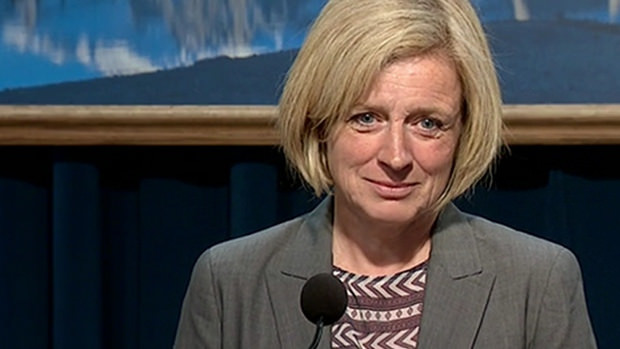rabble is expanding our Parliamentary Bureau and we need your help! Support us on Patreon today!
Rachel Notley’s ANDP government re-election campaign has started.
The next Alberta provincial election result will be a de facto referendum on Rachel Notley’s climate change plan. The closest recent example of a policy action driving similar electoral dynamics is “Obamacare” in the U.S. The fact that Alberta’s energy sector gains benefits is as electorally irrelevant to the right as the benefits Obamacare provides U.S. health corporations are to Republicans.
But even if this is the policy issue that frames the next election, it will not be necessarily the issue or issues that will drive votes on Election Day. The central issue of 1988 federal election was free trade, but the issue that drove vote choice during the closing weeks of the campaign were the negative judgements about Liberal leader John Turner among a crucial number of swing voters. When Brian Mulroney and the Progressive Conservatives made Turner the ballot question, they won back enough swing voters to win another majority, despite free trade worries.
Notley’s climate policy also poses a strategically challenge to both the Alberta Wildrose and PC parties. While both are right wing, they are not the same. They reflect different segments of Alberta’s right. Though united under Ralph Klein, the conflicts that split them under Ed Stelmach and Alison Redford have not vanished.
Wildrose has significant advantages, courtesy of its populism and official opposition status, but difficulty appealing to moderate voters. The PCs are the “centre” party in Alberta, and have deep ties in every community. Both are still finding their political footing against Notley’s NDP and each other. How they respond to Notley’s policy will frame both for years to come, and into the next election.
Beyond partisan dynamics, voter perceptions of Notley’s climate change policy will be shaped by future policy details, the effectiveness of the policy implementation process, and their substantive consequences. A recurrent problem NDP governments in Ontario, British Columbia and Nova Scotia faced is their inability to ensure that policy implementation minimizes popular hostility while increasing support for progressive initiatives.
A substantial source of the endemic policy cautiousness within the NDP are the politically devastating experience of recurrent implementation failures. The B.C. and Ontario NDP are still paying for long-past failures in recent elections. The failure of past ambitions have bred deep caution among many senior New Democrats.
Notley’s climate change announcement is unquestionably ambitious. But if it is not properly implemented, it is also electoral suicide. Rachel Notley is gambling the Alberta NDP will achieve what the B.C. and Ontario NDP governments could not. Achieving this takes more than hope and good intentions, it requires a vast increase in the ANDP’s political competence and capacity.
NDP governments elsewhere have been crippled by their inability to manage public perceptions. Building popular policy support and sustaining government credibility, especially in the face of strong attacks, is crucial to policy implementation and re-election.
Many on the left disparage the importance of effective professional political communication. But in electoral politics, it is the difference between cheers and tears. While Rachel Notley is a remarkable communicator, Alberta New Democrats have to build their own grassroots communication effectiveness and appeal.
Alberta New Democrats also have to overcome their organizational weakness. Despite winning government, the ANDP’s grassroots organization still resembles that of a marginal opposition party. Building the strength needed to win is certainly possible — and essential — but it requires a far higher level of local grassroots activism and effectiveness than has been a historical feature of the ANDP. Policy initiatives like climate change can help build party strength the same way that effective opposition parties use issue campaigns to rally support, but only if local activists do the hard work needed.
Interest group and social movement support are also important, but not the same as building mass party electoral capability. These can be complementary, when properly managed. No NDP government can afford the types of movement-party conflicts that crippled NDP reelection prospects in Ontario, B.C. and Nova Scotia. Managing expectations is important, as is delivering tangible progress.
Good “social partnership” relations, and even delivered promises, will not win reelection for the ANDP if it does not massively expand its central and local party capabilities. These are continuing challenges and, now that the federal election is over, the dominant ones facing Alberta’s New Democrats.
Notley’s climate announcement is a major part of the ANDP’s reelection campaign. It is also akin to announcing plans to serve a main course for dinner. The rest of the dinner still has to be planned, ingredients stocked, the dishes cooked, and finally served. The challenge facing Alberta New Democrats is to learn from the experiences of siblings elsewhere without repeating them.
If the ANDP is successful, then Notley’s ambitious climate policy will become the crown jewel of the ANDP government’s record, and the centrepiece of its re-election campaign. But victory will only be won if Alberta’s New Democrats rise to the challenges now before them.
rabble is expanding our Parliamentary Bureau and we need your help! Support us on Patreon today!
Image: Flickr/Day Donaldson




